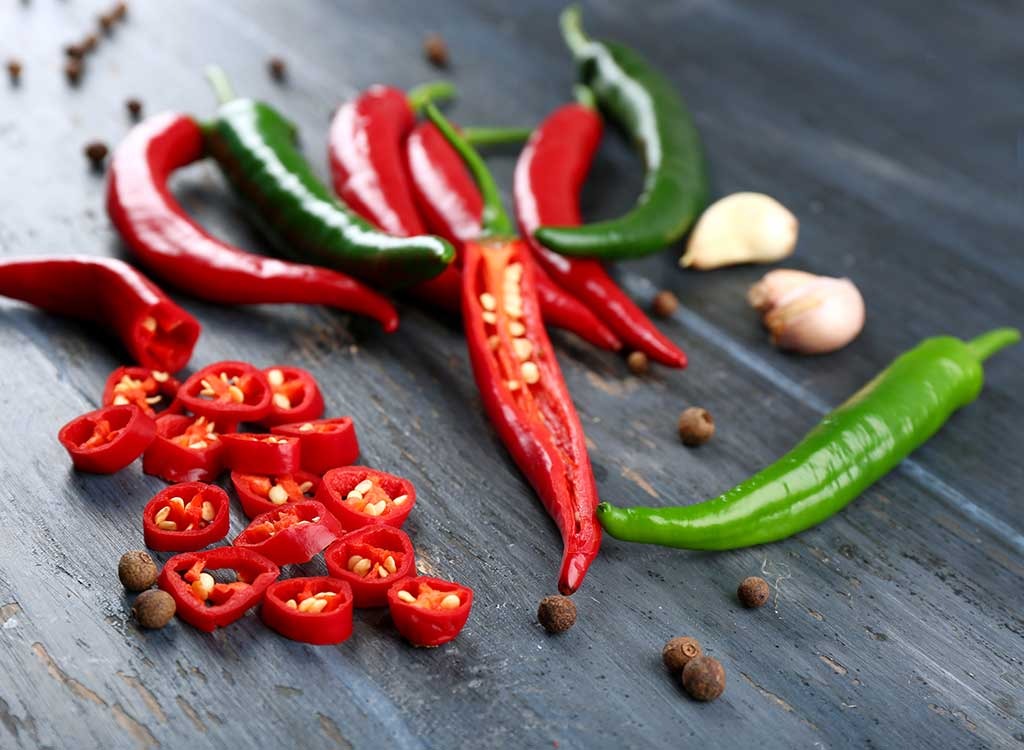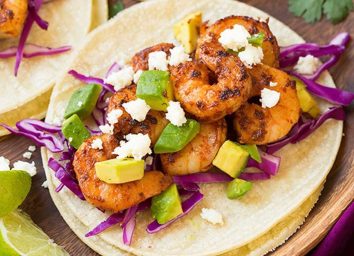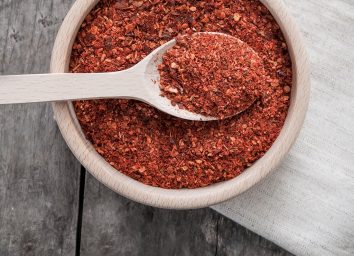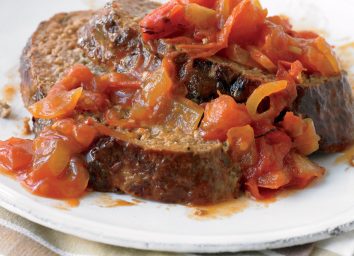Why Some People Love Spicy Food and Others Can’t Handle It

Do you like spicy food? The answer is one of the culinary world’s great litmus tests—probably even more divisive than whether you think cilantro tastes like soap. But no matter how many cartoon chilies you like to see on the menu next to your dinner selection, there’s a reason why you prefer your food that way. What’s going on? We asked some RDs to explain why some people love spicy food and others don’t.
What happens to your body when you eat spicy food?
First, it helps to understand why food feels spicy: it’s thanks to a class of compounds called capsaicinoids. “These compounds give peppers their heat, but when you eat any spicy pepper, your taste buds do not taste the heat from the pepper directly. Rather, you are actually tasting the sensation of heat,” says Jim White, RD, ACSM EX-P, and owner of Jim White Fitness and Nutrition Studios. “The receptors in your mouth and tongue that sense hot temperatures and pain are the same receptors that are irritated when consuming spicy foods,” he explains, adding that once those receptors get irritated by the capsaicinoids, your brain thinks you’re eating something hot and attempts to cool your body. “Even though the temperature of the chili may be room temperature, the receptors in your mouth believe it is actually heat,” he says. “From this, your body may start sweating to bring its temperature back down.”
That initial tongue fire isn’t the only way your body deals with hot foods. As most of you well know, that pepper is going to stay with you from the moment you put it in your mouth until the moment it leaves your body. And for some people, that’s a less-than-pleasant process. As White explains, “Capsaicinoids first stimulate saliva production in the mouth. It also aggravates mucus membranes found in your nose, eyes, and throat, which can lead to watery eyes, a runny nose, and even sneezing during your meal.” Then the food moves into your stomach, where “the capsaicinoids relax your upper stomach sphincter, which allows food to later backtrack up your esophagus.” If you’re wondering why you get heartburn or burp like an old grandpa after you eat a spicy meal, that’s the reason. But wait, the fun isn’t over yet. “In addition to the possible heartburn, your stomach will also increase its production of highly acidic gastric juice,” says White. “This increase in acidic gastric juice means that when spicy food is fully digested, it can lead to an uncomfortable burning feeling after a bowel movement.”
Why do people like spicy food?
Despite all that, many people truly enjoy spicy food, and many are able to tolerate “hotter” food than others. Why is that? The short answer is that everyone’s bodies and sensory perceptions are different. As Maya Feller, MS, RD, CDN of Maya Feller Nutrition, explains: “The spiciness from different foods is based on the individual food’s heat index, as well as a person’s individual taste receptors. So one person may be incredibly sensitive, where another finds a scotch bonnet pepper as mild as a bell pepper.” Cultural influence and basic personal preference also play a role. “People have likes and dislikes as well as cultural food pathways that introduce them to varying degrees of spicy foods from a young age,” Feller says.
It’s possible that the predilection for spice might begin even earlier than that. “There is research indicating that a person’s food preference starts even before you are born,” White says. “This means the foods your mom was eating while she was pregnant and breastfeeding can also influence the foods you tend to favor—such as spicy, sweet, or salty. Infant and young children’s taste buds are also influenced by what they are exposed to at a young age. This may be why those who grew up in homes that integrate large amounts of spice in their cooking are more adapted to eating spicy food as an adult.”
No matter how high or low your tolerance for spicy foods may be, pay attention to what your body is telling you when you eat them. Common post-meal discomforts include sweating and heartburn, and people with sensitivities need to be even more careful. “Spicy food can stimulate saliva and gastric juices,” Feller says. “For people with ulcers, GERD, and a sensitive GI, this can create upset.”
And pro tip: You might want to avoid the infamous ghost pepper altogether. “There have been documented cases of people dying from consuming ghost peppers, the world’s hottest pepper,” White says. “According to Dr. Paul Bosland, the founder of the ghost pepper, 3 pounds of this chili can kill a 150-pound person if consumed in a short enough amount of time.”
What to do if you eat too much spicy food
If you do find yourself in an unexpected five-alarm fire and need an immediate cool-down, White says, “Try eating some of the foods that bind to the capsaicin molecule, such as dairy, bread, and rice.” But whatever you do, remember that water is not your friend when eating spicy foods. As White helpfully reminds us, “Drinking water does not help counterbalance the effect of spice and actually spreads the molecules in your mouth, making it more painful.”








